Differences Between Bookkeepers, Accountants and CPAs
If you’re considering bookkeeping services or other financial services, you may eventually see words such as “bookkeeper,” “accountant” and “CPA.” For many people, these words are used interchangeably and refer in general to financial professionals. However, there are important differences between these roles and understanding these variances can help you determine who you need to work with for the best results. If you run a business, knowing which financial professional to call can help you make the right decisions.
The Role of a Bookkeeper
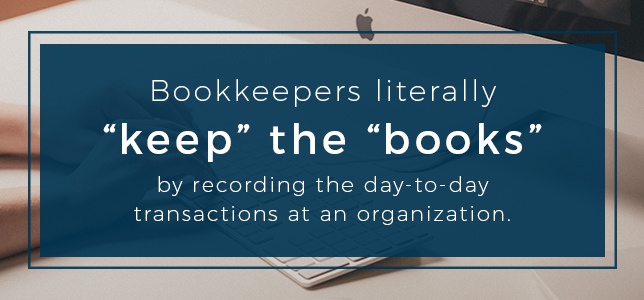
Bookkeepers perform much of the data entry roles related to finances at a company. They literally “keep” the “books” by recording the day-to-day transactions at an organization. In general, bookkeepers will have at least an associate’s degree and two or more years of experience before being considered professional bookkeepers. Some also pursue certification through the AIPB (American Institute of Professional Bookkeepers).
Bookkeepers can be responsible for:
- Processing payroll information
- Entering vendor bills into a financial system
- Creating sales invoices
- Sending statements to customers and invoices to vendors
- Updating information in QuickBooks, Peachtree or other financial software
- Keeping track of debits and credits to create a trial balance
- Ensuring employees submit the correct paperwork for payroll
- Following up on invoices
- Balancing and recording ledgers, subsidiaries, historic accounts and other records
- Ensuring all financial data required to stay compliant is tracked
A bookkeeper can take all the transactions a company has to make and ensures bills, invoices and other transactions are handled correctly. This professional can also keep financial information organized for tax season or for an accountant. In addition, by channeling financial data into useable formats, a bookkeeper can help a business determine whether any strategic changes need to be made to expenses, bills or any other part of finances.
One of the most important roles a bookkeeper is responsible for is maintaining a general ledger. This is the record of all expense and sales receipts for a company. Depending on the number of transactions a company completes, this record may need to be updated every day, every week or even multiple times a day. To stay compliant with tax rules, your business needs to record all sales and purchases made, and the IRS requires some purchases and sales to include supporting documents.
A bookkeeper can keep your records up-to-date and complete, so the amounts of all sales and purchases are properly recorded, and any required supporting documents are attached and easily accessible. Whether you keep your general ledger in a paper format or use a software program, a bookkeeper can make the process simple and can ensure your records are complete and easy to read.
The Role of an Accountant
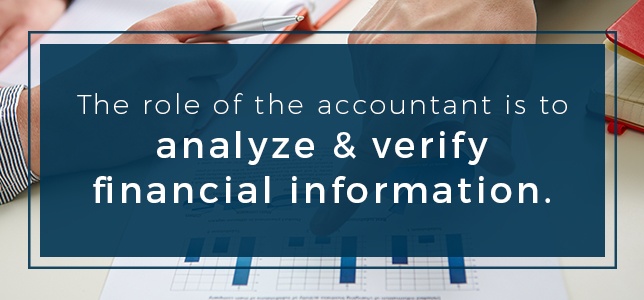
Most accountants have at least one degree in accounting. The role of the accountant is to analyze and verify financial information. An accountant will prepare and adjust entries and accounts. The accountant will also prepare financial statements for a company and will advise a company’s managers and executives about how specific decisions could impact a business’s finances. Among other tasks, an accountant will:
- Adjust and determine wages to be processed for employees
- Create allowances for uncollected accounts
- Prepare balance sheets, cash flow statements, tax returns, income statements and other statements
- Verify the financial information entered into financial software or ledgers
- Prepare Audits
- Analyze Accounts
- Oversee the work of the bookkeeper
An accountant, in other words, will take the financial information recorded by the bookkeeper and will use it to generate information useful to a business. The information from an accountant can help an organization determine how to proceed in the future. Once an accountant has helped to determine any changes that need to be made to specific transactions, the bookkeeper can normally handle the changes or adjustments to the transactions.
Accountants often help a business with big picture decisions and help guide an organization when making forecasts or when determining the current path of a business. For example, if a business is overspending in a specific area or is not generating enough revenue or growth to be successful long-term, an accountant can help an organization realize this and may be able to offer forecasts or projections of changes to be made to secure a better outcome.
Smaller businesses may need to work with an accountant occasionally when making long-term decisions. Companies with many employees or with more than one million dollars in revenues may want to hire an accountant or work with one more closely to meet the greater financial responsibilities of the company.
The Role of a CPA
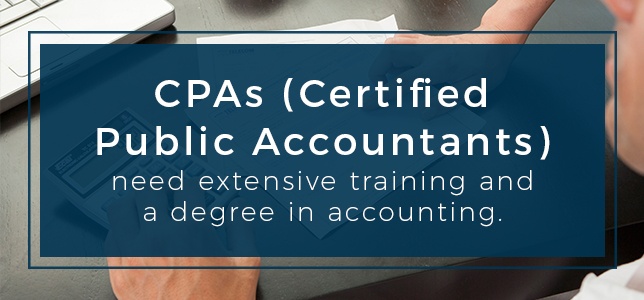
CPAs (Certified Public Accountants) need extensive training and a degree in accounting. They must also meet regulations regarding experience and ongoing education before they pass the Uniform Certified Public Accountant Examination. Every state has slightly different rules about CPAs, but in general, all require these professionals to have certification and education. CPAs will also need to renew their certification every two years in their state.
CPAs take on more duties and obligations when compared with accountants and bookkeepers. They oversee and audit company financial information and may work with an organization’s bookkeepers and accountants. CPAs offer a range of financial, tax and auditing services.
Are Bookkeepers Less Expensive When Compared With Accountants?
The costs of bookkeepers will depend on a number of factors, including the business size and complexity as well as the specific needs of an organization. A small business with one or two product lines will not need complex bookkeeping when compared to a corporation with multiple offices.
The types of bookkeepers hired can also make a difference. Outsourced bookkeeping services, for example, are generally far less expensive than an in-house bookkeeper, especially in a larger city. Many small business bookkeeping solutions use outsourcing to provide budget-friendly financial solutions.
Costs of a bookkeeper will also depend on the services needed. As financial software is increasingly used for bookkeeping and as these programs become more sophisticated, the line between bookkeeper and accounting has shifted somewhat. Today’s programs may allow a bookkeeper to not only record day-to-day transactions, but also to generate some financial reports and statements. If your bookkeeper is responsible for additional tasks, this could affect pricing but could help you save money when compared with hiring an accountant for some of those same tasks.
In general, bookkeepers are less expensive than accountants or CPAs. They can also help a business save money in the long-term. By maintaining good records, bookkeepers reduce the amount of time accountants or tax professionals need to review documentation and data, reducing those costs. Bookkeepers can also alert a company of some obvious issues or problems with bookkeeping or finances early, which can help a business address those issues quickly, before they become more complex and expensive to fix.
How Do You Choose a Qualified Bookkeeper?
While some small businesses only see their accountant or CPA once a year, a bookkeeper is more likely to be consulted more regularly. Since you will be seeing your bookkeeper more often and since this professional has a direct impact on the information you gather and need to stay compliant, you will want to take the time to find the right fit.
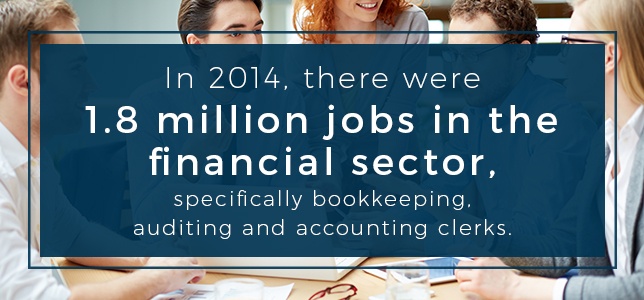
In 2014, there were 1.8 million jobs in the financial sector, specifically bookkeeping, auditing and accounting clerks. While the numbers are expected to decline over the next 10 years, if you are looking for a financial professional, you clearly have many options to choose from. If you’re looking for a bookkeeper, you can find a qualified professional by:
- Considering your needs. Do you need someone to be at your office every day? Do you use financial software and only need someone to enter financial data once a week or once a month? What, exactly, do you hope to get from using the services of a bookkeeper?
- Looking for bookkeeping services for a small business or your specific organization. If you are a small business, look for a bookkeeper or bookkeeping service with experience in that particular sector. They will better understand your specific needs and the compliance issues surrounding your company. Consider industry experience, too. If you own a legal firm, for example, look for a service with experience handling legal bookkeeping to ensure you work with someone knowledgeable about the specific bookkeeping needs of your organization.
- Checking qualifications. Look for bookkeeping services or a bookkeeper with the background, education and experience needed for the task. If you use a specific financial software, for example, make sure you will be working with someone who is extremely experienced with that program. Look for someone with years of experience and who has secured up-to-date training so they are aware of the latest best practices and regulations.
- Checking recommendations. How happy are other customers with the bookkeeping services they are getting? Check to see if any bookkeeping service or any bookkeeper you are considering has helped other clients who are satisfied with the services they have received.
- Creating a system of checks. Even if you hire a bookkeeper, you still need to maintain some records yourself, and you will need to look over the financial transactions (or hire an accountant to do so). Keeping some records yourself ensures you have the raw data your bookkeeper needs for their job. Having more than one person reviewing the records also ensures all records are kept correctly and are easily accessible.
- Talking and listening. One of the best qualities of a bookkeeper is that they can explain complex financial concepts you need to know. You can get the most out of your relationship with a bookkeeping service if you can learn more about your records and finances. Speak to any bookkeeper before you hire them and ask lots of questions. Can the bookkeeper explain financial concepts to you in plain English? Do they address your concerns and needs? Do they have a plan for tackling your ledgers and records? Look for someone you feel comfortable with and who uses terms you can understand.
- Looking for additional services. Create a long-term relationship with a bookkeeping service by selecting a service with a range of options so you don’t have to seek out a new professional as your business grows. Choose a bookkeeping service with financial forecasting services, accounting services, payroll services, consulting services and other services so you have a one-stop solution when you need help.
- Looking beyond the ledger. Look for a bookkeeping service offering advice and support as well as transactional and recording services. Bookkeepers work with a lot of financial data, so they may be in a uniquely qualified position to make suggestions or to offer advice. Find a bookkeeper willing to offer consulting as well as advice so you can start making use of your financial records as fully as possible.
Why Should You Hire a Bookkeeper?
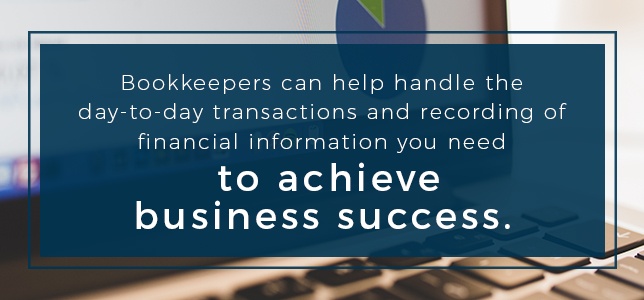
Bookkeepers can help handle the day-to-day transactions and recording of financial information you need to achieve business success. When you are running a company, you may be busy working with clients and customers. At the end of a day or week, you may have a pile of receipts, invoices and other paperwork. A bookkeeper can make sense of all of this, so you don’t have to spend more of your time entering and sorting financial information.
A bookkeeper also helps you stay compliant. If you are a corporation, you need to meet strict SEC transparency rules and you need to ensure your books and ledgers can stand up to scrutiny. Even small businesses need to stay compliant with tax regulations and financial reporting rules, and a bookkeeper ensures you keep the strong records you need to stay compliant.
By taking care of everyday financial transactions, a bookkeeper can help you save money and can keep business flowing smoothly. For instance, a bookkeeper can ensure employees submit the right paperwork and can work to keep payroll on time, ensuring employees are happy. A bookkeeper can also make sure invoices are paid or get followed up on, keeping cash flow stronger. By ensuring bills are paid on time, a bookkeeper can save you substantial money in late fees.
Even before you start a business, a bookkeeper can be invaluable in offering consultation services to assist you with setting up your company ledgers correctly. Before you launch your company, a bookkeeper may be able to help you choose a financial or record-keeping program and can review some of the bookkeeping and financial questions you may have. They can help you understand your bookkeeping and financial responsibilities and ensure you stay compliant from the moment you open your doors.
Finally, a bookkeeper can help you with gathering and processing the financial information you need to succeed in business. At heart, much business success comes down to being able to manage money and finances wisely, so you need to keep careful track of invoices, payroll, bills and other transactions. A bookkeeper can help you do that so you have the foundational data you need to take to an accountant or to look over yourself to make changes to your business. For instance, if you notice your employee credit card is being used to make duplicate purchases, you can work to ensure employees don’t overspend. A bookkeeper can keep records so you notice any areas where you can make changes or save.
Choose SLC Bookkeeping
If you’re ready to hire a bookkeeper to get a financial edge in your business, at SLC Bookkeeping, we can help. We can take care of your concerns with outsourced small business bookkeeping services designed to save you time with the books, leaving you free to focus on your business success. We can also explain bookkeeping concepts to you in simple English and are pleased to offer a free quote. Contact us today.


Comments